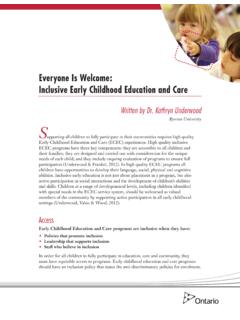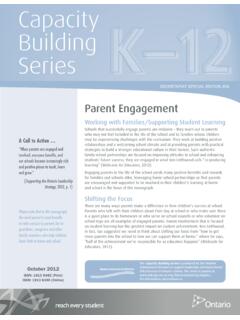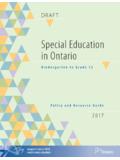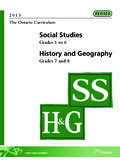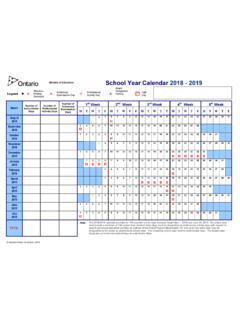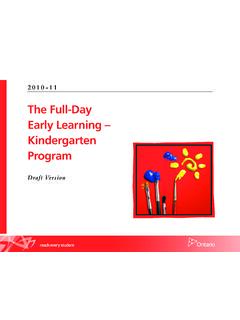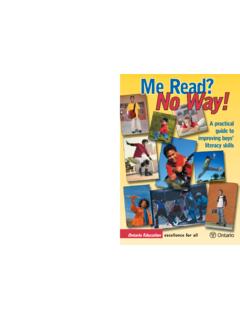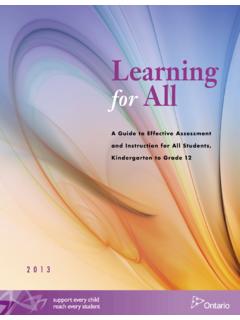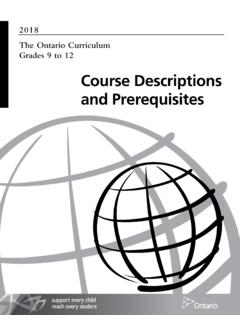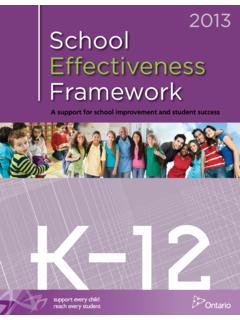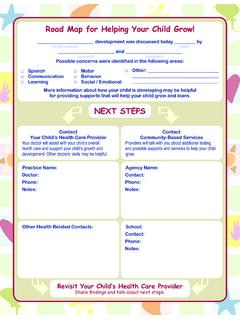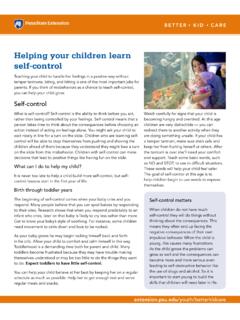Transcription of Reading and Writing with Your Child - edu.gov.on.ca
1 Kindergarten to Grade 6 Reading and Writing with your ChildWritingThinkingReadingReading and Writing with your Child , Kindergarten to Grade 6 is an update of the Ontario Ministry of Education s helping your Child with Reading and Writing : A Guide for Parents. Produced by the Literacy and Numeracy Secretariat in partnership with the Parent Engagement Office. New to this edition: links to games and activities and Writing with your Child , Kindergarten to Grade 6: A Parent Guide1 Note to Parents ..2 How Can I Support My Child s Learning? ..3 Reading and Writing Milestones ..4 Before your Child begins to read and write ..5 When your Child is first learning to read and write ..6 As your Child learns to read and write ..7 As your Child becomes a more fluent reader and a clearer writer ..8 As your Child continues to grow as a reader and writer ..9 Four Top Literacy Tips for Parents ..10 Talk with your Child .
2 10 Build habits of understanding ..12 Read every day ..14 Make it fun, make it matter ..16 Expect the Best of your Child ..18 Online Resources ..19 The greater the support that families provide for their children s learning and educational progress, the more likely that their children will do well in school and continue on with their education. Karen Mapp and Anne Henderson, 2002 A New Wave of Evidence: The Impact of School, Family, and Community Connections on Student AchievementNOTE TO PARENTSYou are your Child s first your support, your Child will grow up to become an excellent reader with strong Writing skills and what a difference that will make when he or she enters college, university or the workforce one day! You don t need a lot of special skills to help your Child learn to read and write. Just spending time with your Child doing everyday activities makes all the difference in the world.
3 Whether your Child is just starting out or can already read and write, there is always room for more learning. As your Child grows older, he or she will enjoy new opportunities and new successes because a first teacher you took the time at home to actively talk, play and listen. All this helps reinforce what your Child learns at school. We have created this guide to help you support your Child . All tips are based on Ontario s curriculum and are connected with what your Child is learning in school. Remember, lifelong success starts with strong Reading and Writing skills. And that means your Child s lifelong success starts with you. Have fun learning together! helping students succeed in Reading and Writing is part of Achieving Excellence: A Renewed Vision for Education in Ontario. Learn more at note: In this guide, the word parent refers to parents, guardians, caregivers and other family members who help children learn to read and and Writing with your Child , Kindergarten to Grade 6: A Parent Guide2 HOW CAN I SUPPORT MY Child S LEARNING?
4 Learning to read and write happens at school AND at home. This guide contains practical information that will help you support your Child with Reading and Writing at home. It suggests easy and fun activities that you can do with your Child from Reading food labels and Writing grocery lists, to talking together on the way to sports practice, to discussing a movie with the entire family. All these shared experiences will help develop your Child s literacy skills. The home-school connection is also important to your Child s success. When children see their parents working with their teachers, they feel more secure and confident about school. Talk to your Child s teacher to help build your Child s confidence and to find out more about how you can support your Child s learning. All children change physically, intellectually, emotionally and socially as they grow up. Yet each Child brings unique abilities, needs and experiences to learning.
5 By acknowledging and affirming your Child s unique personal and cultural identity, you will help your Child flourish as a reader and , remember that learning to read and write does not take place all at once. Everyone learns at a different rate. It just takes time, practice and support. Whenever you can, wherever you can, encourage your Child and show that you have confidence in his or her and Writing with your Child , Kindergarten to Grade 6: A Parent Guide3 Reading AND Writing MILESTONESThe best time for children to start learning to read and write is when they are very young. This is when they begin to develop positive attitudes and basic skills. Reading to children and talking to them about their ideas (even if those ideas don t make sense to you right away) helps children reach a deeper level of understanding. If you and your Child are more comfortable in a language other than English, please use it!
6 Reading and talking to your Child in the language of your home is very to read and write involves a number of stages that eventually lead to Reading fluently and Writing clearly. The next few pages capture the development of literacy from the early years to the junior grades and beyond. 4 Reading and Writing with your Child , Kindergarten to Grade 6: A Parent GuideREADING AND Writing MILESTONESB efore your Child begins to read and writeYoung children are eager learners and can develop literacy skills in a variety of ways. In this stage, your Child : Likes to be read to and to look at books or words Learns about words by playing with letter blocks, looking at picture books, playing with magnetic letters, singing songs and Reading simple traffic signs or logos on food packages Begins to understand that his or her own thoughts can be turned into text, whether on paper or on a computer, by using pictures, symbols and letters Begins to act like a reader for example, holds a book or e-reader, or works a computer mouse and pretends to read Begins to act like a writer for example, holds a pencil, crayon or marker and pretends to write, types on a keyboard, makes letters with modelling clay Uses both recall and pictures to tell the story Is curious and asks lots of questions about his or her worldFor some fun things to do, visit and click on Ages 2 to 5 for these great recognition (phonics)
7 Magic Mailbox ABC s Click on the mailbox to hear the different letter names of the alphabet. Letterella (Beginner Level) Learn the different letter sounds of the alphabet. 5 Reading and Writing with your Child , Kindergarten to Grade 6: A Parent GuideReading around us (environmental print)Sign MatchMatch the signs that you see around you. Understanding what we read ( Reading comprehension)Out of Order Put the story pictures in order. Gis le s Big Backyard Book Club Listen to great stories! Reading AND Writing MILESTONESWhen your Child is first learning to read and write When children are first learning to read and write, it is important to talk about the ideas they are Reading about. This will help build their comprehension skills. In this stage, your Child : Begins to match written words to spoken words and to see relationships between sounds and letters Begins to experiment with Reading and says words out loud when Reading Finds pictures on the page or screen helpful in understanding the meaning of words Begins to experiment with Writing for example, writes symbols that resemble letters, writes groups of random letters and then eventually writes real words Asks questions about what he or she would like to learn (encourage this interest!)
8 For some fun things to do, visit and click on Ages 2 to 5 for these great recognition (phonics)Alphabet Goop Learn all about the beginning sounds of familiar words. Letterella (Pro Level)Learn all about the beginning sounds of familiar words. 6 Reading and Writing with your Child , Kindergarten to Grade 6: A Parent GuideRhyming: nursery rhymes and rhyming wordsLoosey Goosey RhymesLearn all about words that rhyme in nursery rhymes. Rhyme TimeWatch, click, learn and listen to these fun nursery rhymes. Words we often see: sight words/high-frequency wordsMelvin s Marvellous Words Learning sight words helps you become a better reader. Melvin s Marvellous StoriesLearning sight words helps you become a better reader. Reading AND Writing MILESTONESAs your Child learns to read and write With regular practice, children develop fluency in Reading and Writing . At the same time, they will also learn to think more deeply about the stories or information that they read.
9 In this stage, your Child : Is able to adapt his or her Reading to different types of Reading materials, recognizes many words, knows how to make sense of words and is willing to try Reading new things Writes simple sentences by using real letters, spaces between words and some punctuation Enjoys Writing and shows interest in Writing in different ways for example, writes grocery lists, short emails or text messages Starts to be aware that media are used for different purposes for example, to educate, to convey a message or to sell somethingFor some fun things to do, visit and click Ages 11 and Under for these great : spelling familiar wordsWord Magic Practise spelling by yourself or with another player. and Writing with your Child , Kindergarten to Grade 6: A Parent GuideUnderstanding what we read ( Reading comprehension): describing objectsBump-A-Word Use describing words in your Writing to make it more interesting.
10 Grammar: parts of speechBig Escape Learn about nouns, verbs, adjectives and many other grammar goodies. (Be sure to check out all four chapters of The Big Escape.) HAVEANICEDAYHAVEANICEDAYREADING AND Writing MILESTONESAs your Child becomes a more fluent reader and a clearer writer Fluent readers think about what they are Reading in the context of other experiences they have had. In this stage, your Child : Connects ideas and experiences in print to his or her own knowledge and experience Predicts events in a story Values Reading and does so on his or her own initiative Extends Reading skills to Writing and begins to: - Use a variety of strategies to spell words correctly - Use a variety of types of sentences - Write about things he or she cares about (it could be your family, a video game or a pet) For some fun things to do, visit and click Ages 11 and Under for these great games.
